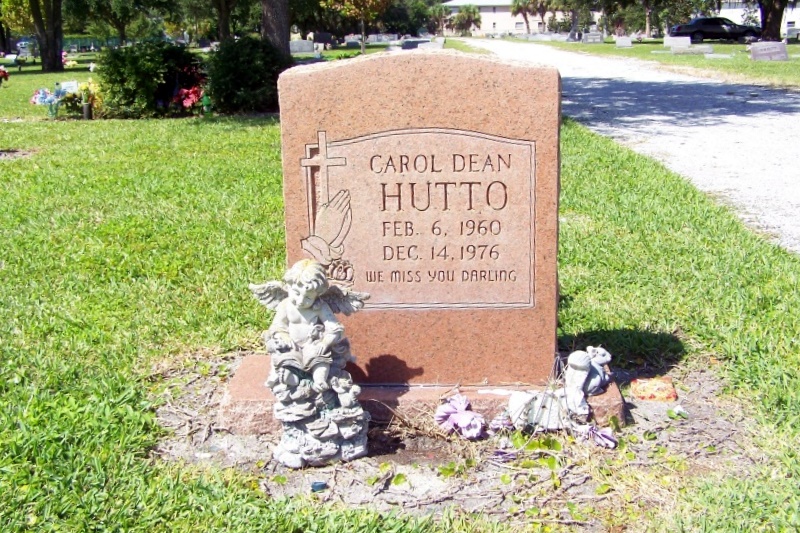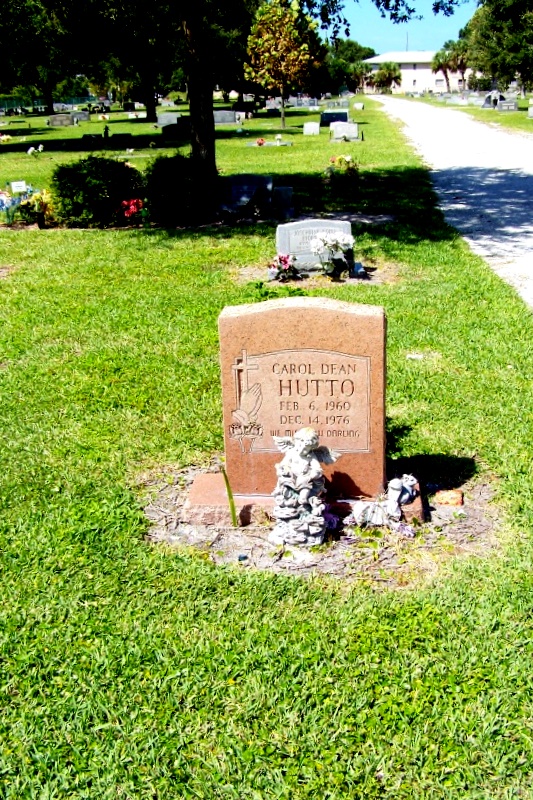The Largo High School junior never returned.
Her body was found the next day in a pond two blocks from her family's home on Corvette Drive. Someone had weighted it down with concrete blocks.
For nearly two decades, the case went unsolved.
Then in 1994, two Largo Police investigators reopened the case. Their determination led them to the killer, James Brian Kuenn, a former Largo resident who by then was a U.S. Navy petty officer on a submarine based in Connecticut.
The story of their search for the murderer will be retold this fall during an upcoming episode of Cold Case Files, a non-fiction forensics genre show on the A&E television network. The exact date for the show has not been set.
A film crew from Chicago-based Kurtis Productions recently was in Largo conducting interviews and shooting locales, including Largo High School and Carol's neighborhood.
Michael Harvey, the show's executive producer, said the Largo case was selected for its many compelling aspects: the dogged determination of the police, the relatively new forensic science of DNA testing, the number of years the case went unsolved and the cooperation between the Largo Police Dept. and the Naval Criminal Investigative Service, which joined the investigation in 1994.
"It was a case that could have easily been forgotten, but it wasn't," Harvey said. "It was the combination of old and the new that helped solve this case."
Carol's mother, Norma Hutto, was interviewed. She remembered Carol as a girl who loved doing things with her family.
"She loved to go with us to NASCAR races and wrestling," she said. "She was a Christian girl who was particular who she hung around with."
Mrs. Hutto, grateful detectives reopened and finally solved the case, said she hopes the show will give hope to other families who have lost loved ones.
"I am grateful after all these years to finally have closure," she said. "I am glad they found the killer and that my son is no longer a suspect." For years, Carol's half-brother, Jerry Erwin, was a primary suspect. He found her body in the pond.
Sgt. Mike Short, 43, was the lead detective on the team that cracked the case. A 21-year Largo police veteran, he was interviewed for the program.
"They (show producers) first contacted me two years ago about the case," he said. "After several interviews over the phone, the production company decided to pursue the story."
The police decision to reopen the case is 10 years old. Short and officer Brad Hoyes, who was injured and on light duty, were looking over files of Largo's oldest unsolved murders.
Evidence showed the murder likely was in a home under construction at the time, a block away from the Hutto residence. A charred log had been found in the fireplace and Carol's blue jeans were next to a makeshift bed.
A pink blanket and a raincoat were found near Carol's body. Her watch had stopped at 10:36.
Short and Hoyes focused on her diary. She had written much about Kuenn, then 17. It appeared Carol had a crush on him. Carol's parents told police he had called her the night she left.
"He should have been on the top of the suspect list," said Short.
The day after the homicide, Kuenn told police he hadn't seen Carol the night before. Police were unable to verify his alibi and he never took a polygraph test.
Short and then Lt. John Carroll, now Largo's deputy chief, paid a surprise visit to Connecticut, where Kuenn was stationed. This time, Kuenn contradicted his previous statements and admitted he did see her that night.
"He told us, he barely remembered anything," recalled Short, who had gone to Largo High with Kuenn. Short said Kuenn told him: "I put up walls. If I remember, I'm going to jail."
"We knew then we had the right guy," Short said.
The next day, however, Kuenn sought legal counsel, declined any further interviews and refused a polygraph.
Police and prosecutors didn't think they had enough evidence to guarantee a first-degree murder conviction. Anything less than first degree and Kuenn would likely go free because of the statute of limitations.
Two years later, in 1996, the NCIS cold case squad joined the investigation. Time was not on the side of investigators, but technology was.
In the late 1980s, forensic scientists began testing DNA to prove guilt or innocence in criminal cases. By the late 1990s, methods began to focus on mitochondrial DNA, found in tiny organelles in human cells, which are more likely to survive over the years.
It was in 1998, with the help of the NCIS, that the Largo police submitted hair samples found at the scene to an FBI laboratory.
They learned a hair found on the jeans was not Carol's. They were able to obtain a search warrant to compare Kuenn's DNA with the evidence.
By then Kuenn, 38, was a father and married twice.
Minutes after giving DNA samples, Kuenn confessed to NCIS agents. Short watched the confession from a room across the hall.
Kuenn recalled the fateful night when he and Carol met at the house under construction. They kissed but the young woman was reluctant to have sex with him. As she struggled, her screams rang out through the foggy night air. Kuenn, under the influence of alcohol and marijuana, hit her with a 2 by 4 to quiet her. He then dumped her in the pond, where she drowned, according to the autopsy.
In 2000, Kuenn, 40, was sentenced to life in prison.
Months later, the hair on the jeans came back. It did not match Kuenn's DNA. Nevertheless, the threat of the DNA led to his confession.
July 11, 2004 St. Petersburg Times
This case was also featured on the documentary series of Cold Case Files
The Largo High School junior never returned.
Her body was found the next day in a pond two blocks from her family's home on Corvette Drive. Someone had weighted it down with concrete blocks.
For nearly two decades, the case went unsolved.
Then in 1994, two Largo Police investigators reopened the case. Their determination led them to the killer, James Brian Kuenn, a former Largo resident who by then was a U.S. Navy petty officer on a submarine based in Connecticut.
The story of their search for the murderer will be retold this fall during an upcoming episode of Cold Case Files, a non-fiction forensics genre show on the A&E television network. The exact date for the show has not been set.
A film crew from Chicago-based Kurtis Productions recently was in Largo conducting interviews and shooting locales, including Largo High School and Carol's neighborhood.
Michael Harvey, the show's executive producer, said the Largo case was selected for its many compelling aspects: the dogged determination of the police, the relatively new forensic science of DNA testing, the number of years the case went unsolved and the cooperation between the Largo Police Dept. and the Naval Criminal Investigative Service, which joined the investigation in 1994.
"It was a case that could have easily been forgotten, but it wasn't," Harvey said. "It was the combination of old and the new that helped solve this case."
Carol's mother, Norma Hutto, was interviewed. She remembered Carol as a girl who loved doing things with her family.
"She loved to go with us to NASCAR races and wrestling," she said. "She was a Christian girl who was particular who she hung around with."
Mrs. Hutto, grateful detectives reopened and finally solved the case, said she hopes the show will give hope to other families who have lost loved ones.
"I am grateful after all these years to finally have closure," she said. "I am glad they found the killer and that my son is no longer a suspect." For years, Carol's half-brother, Jerry Erwin, was a primary suspect. He found her body in the pond.
Sgt. Mike Short, 43, was the lead detective on the team that cracked the case. A 21-year Largo police veteran, he was interviewed for the program.
"They (show producers) first contacted me two years ago about the case," he said. "After several interviews over the phone, the production company decided to pursue the story."
The police decision to reopen the case is 10 years old. Short and officer Brad Hoyes, who was injured and on light duty, were looking over files of Largo's oldest unsolved murders.
Evidence showed the murder likely was in a home under construction at the time, a block away from the Hutto residence. A charred log had been found in the fireplace and Carol's blue jeans were next to a makeshift bed.
A pink blanket and a raincoat were found near Carol's body. Her watch had stopped at 10:36.
Short and Hoyes focused on her diary. She had written much about Kuenn, then 17. It appeared Carol had a crush on him. Carol's parents told police he had called her the night she left.
"He should have been on the top of the suspect list," said Short.
The day after the homicide, Kuenn told police he hadn't seen Carol the night before. Police were unable to verify his alibi and he never took a polygraph test.
Short and then Lt. John Carroll, now Largo's deputy chief, paid a surprise visit to Connecticut, where Kuenn was stationed. This time, Kuenn contradicted his previous statements and admitted he did see her that night.
"He told us, he barely remembered anything," recalled Short, who had gone to Largo High with Kuenn. Short said Kuenn told him: "I put up walls. If I remember, I'm going to jail."
"We knew then we had the right guy," Short said.
The next day, however, Kuenn sought legal counsel, declined any further interviews and refused a polygraph.
Police and prosecutors didn't think they had enough evidence to guarantee a first-degree murder conviction. Anything less than first degree and Kuenn would likely go free because of the statute of limitations.
Two years later, in 1996, the NCIS cold case squad joined the investigation. Time was not on the side of investigators, but technology was.
In the late 1980s, forensic scientists began testing DNA to prove guilt or innocence in criminal cases. By the late 1990s, methods began to focus on mitochondrial DNA, found in tiny organelles in human cells, which are more likely to survive over the years.
It was in 1998, with the help of the NCIS, that the Largo police submitted hair samples found at the scene to an FBI laboratory.
They learned a hair found on the jeans was not Carol's. They were able to obtain a search warrant to compare Kuenn's DNA with the evidence.
By then Kuenn, 38, was a father and married twice.
Minutes after giving DNA samples, Kuenn confessed to NCIS agents. Short watched the confession from a room across the hall.
Kuenn recalled the fateful night when he and Carol met at the house under construction. They kissed but the young woman was reluctant to have sex with him. As she struggled, her screams rang out through the foggy night air. Kuenn, under the influence of alcohol and marijuana, hit her with a 2 by 4 to quiet her. He then dumped her in the pond, where she drowned, according to the autopsy.
In 2000, Kuenn, 40, was sentenced to life in prison.
Months later, the hair on the jeans came back. It did not match Kuenn's DNA. Nevertheless, the threat of the DNA led to his confession.
July 11, 2004 St. Petersburg Times
This case was also featured on the documentary series of Cold Case Files
Inscription
We Miss You Darling








